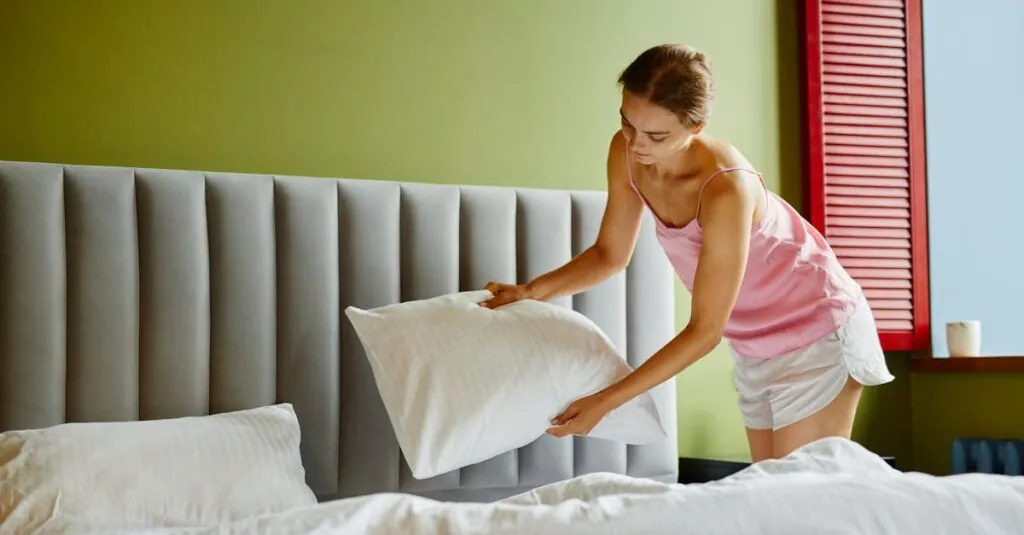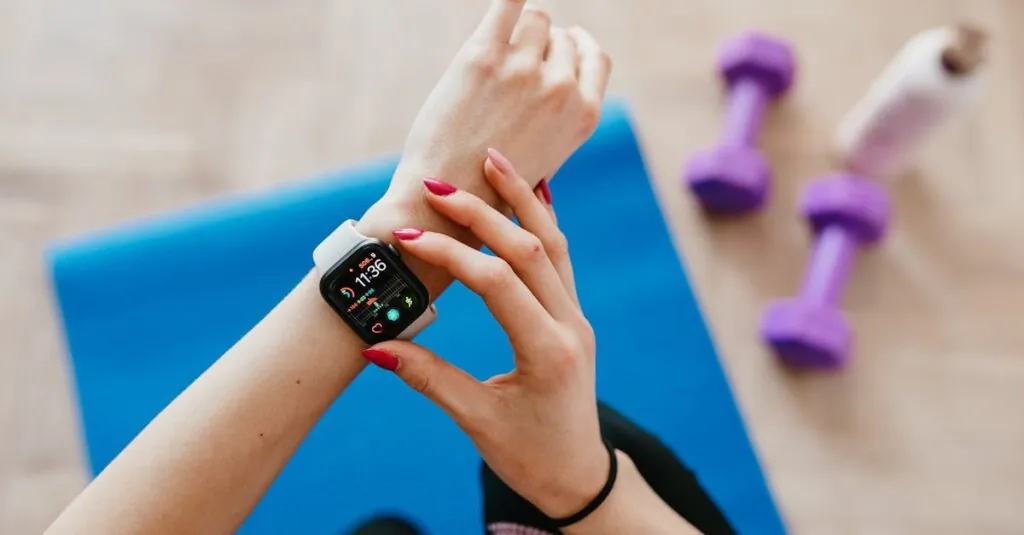In a world where sleep often takes a backseat to Netflix binges and late-night snacking, improving your sleep score might feel like chasing a unicorn. But fear not! With a sprinkle of effort and a dash of humor, transforming those restless nights into rejuvenating slumbers is totally within reach.
Table of Contents
ToggleUnderstanding Sleep Score Improvement
Sleep scores represent a quantitative assessment of sleep quality. Various factors, such as duration and restfulness, contribute to this score, helping individuals identify sleep patterns.
What Is Sleep Score?
A sleep score is a numerical representation of sleep quality derived from multiple metrics. This score often considers total sleep time, sleep efficiency, and interruptions. Wearable devices and sleep apps typically calculate it using data collected through heart rate, movement, and other physiological signals.
Importance of Sleep Scores
Sleep scores play a crucial role in enhancing overall well-being. They provide clear insights into sleep habits, allowing individuals to make informed adjustments. Monitoring these scores can lead to improved sleep hygiene and better health outcomes. By tracking changes over time, users can recognize trends and understand specific factors affecting their rest. A higher sleep score often correlates with increased energy, productivity, and improved mood.
Factors Affecting Sleep Score
Understanding factors that influence sleep scores helps individuals optimize their rest. Two significant components include sleep duration and sleep quality.
Sleep Duration
Sleep duration directly impacts overall sleep scores. Obtaining sufficient hours of sleep matters for rejuvenation and well-being. Adults typically require 7 to 9 hours of sleep per night for optimal health. Short nights can lead to decreased sleep scores and increased fatigue the following day. Many wearables and sleep apps track time spent asleep versus time in bed. Monitoring these metrics helps identify patterns and areas needing improvement. Consistent sleep routines promote longer sleep durations, enhancing overall sleep quality and contributing to higher sleep scores.
Sleep Quality
Sleep quality encompasses how restful and restorative sleep is. Factors like interruptions, sleep cycles, and sleeping environment greatly influence this aspect. Quality sleep features deeper stages that facilitate physical and mental recovery. Research suggests that disruptions, such as noise and light, can hinder deep sleep and lower sleep scores. Creating a comfortable sleep environment, including appropriate bedding and darkness, elevates sleep quality. Good sleep hygiene, like avoiding screens before bedtime, also contributes to uninterrupted sleep phases, further improving sleep scores.
Techniques for Improving Sleep Score
Improving sleep scores involves several strategies. Employing effective techniques can lead to more restful nights and enhanced overall health.
Sleep Hygiene Practices
Establishing a consistent sleep schedule contributes to better sleep hygiene. Going to bed and waking up at the same time daily encourages a natural rhythm. Limiting caffeine intake in the afternoon and evening also fosters better rest. Creating a bedtime routine that includes calming activities, such as reading or gentle stretches, signals the body to prepare for sleep. Maintaining a digital curfew by avoiding screens an hour before bed helps in reducing exposure to blue light, which impacts melatonin production.
Meditation and Relaxation Techniques
Incorporating meditation into the nightly routine aids in reducing stress and anxiety. Daily mindfulness practice can help individuals unwind before bed. Breathing exercises promote relaxation by slowing down heart rates and calming the mind. Progressive muscle relaxation techniques assist in letting go of physical tension, making it easier to fall asleep. Engaging in guided imagery can lead to a peaceful mental state conducive to sleep.
Sleep Environment Optimization
Optimizing the sleep environment plays a crucial role in achieving high sleep scores. Keeping the bedroom cool and dark enhances sleep quality. Utilizing blackout curtains blocks out external light, while white noise machines mask disruptive sounds. Investing in a comfortable mattress and quality bedding ensures a restful sleep surface. Personalizing the space with calming colors and minimal clutter creates a serene atmosphere that encourages relaxation.
Monitoring Sleep Progress
Monitoring sleep progress is essential for enhancing sleep scores and overall well-being. By tracking different aspects of sleep, individuals can make informed adjustments to their routines.
Use of Sleep Trackers
Sleep trackers play a crucial role in monitoring sleep quality. Many devices measure heart rate, movement, and sleep stages throughout the night. Users can gain insights into the time spent in various sleep stages, such as deep and REM sleep. Data gathered by sleep trackers helps identify patterns and disturbances, making it easier to target areas for improvement. Regularly reviewing this information allows individuals to adjust their habits and refine their sleep environments.
Apps and Wearables
Apps and wearables provide valuable tools for tracking sleep. Numerous apps offer easy-to-understand sleep scores derived from user data. These scores reflect sleep duration and quality, guiding users towards healthier habits. Wearables like smartwatches also boast built-in sleep tracking features through sensors. Analyzing trends over time enables individuals to ascertain the effectiveness of changes in their sleep routine. Integrating technology into sleep monitoring simplifies the process, motivating users to prioritize sleep hygiene and achieve better rest.
Improving sleep scores is a journey that requires dedication and a willingness to adapt. By focusing on sleep hygiene and creating a conducive environment for rest, individuals can significantly enhance their sleep quality. Tools like sleep trackers and apps provide valuable insights that empower users to make informed decisions about their sleep habits.
With consistent effort and mindfulness, it’s possible to transform sleep patterns and achieve better overall well-being. Prioritizing restful sleep not only boosts energy and productivity but also elevates mood and health. Embracing these strategies can lead to a more refreshing and restorative sleep experience.





